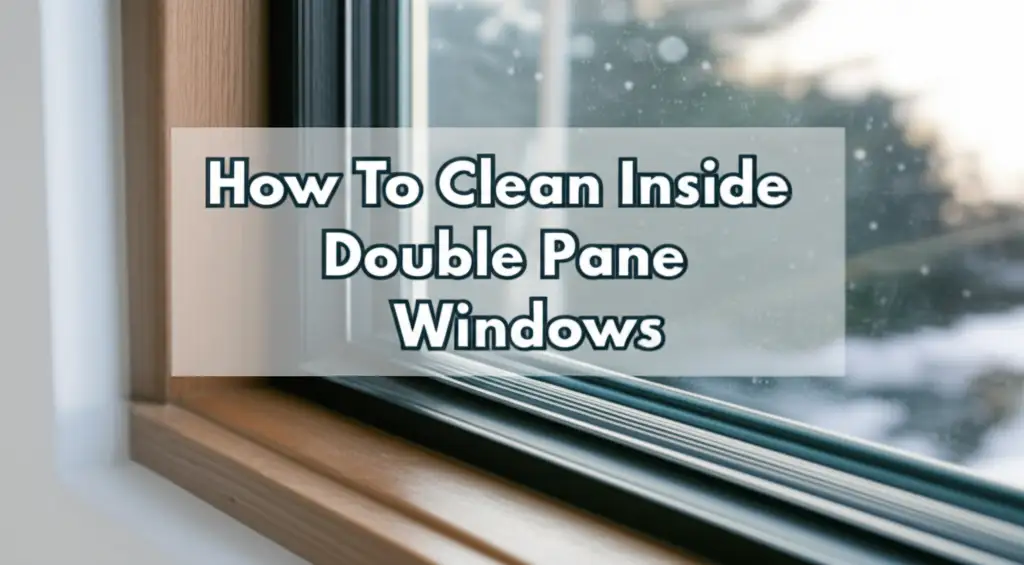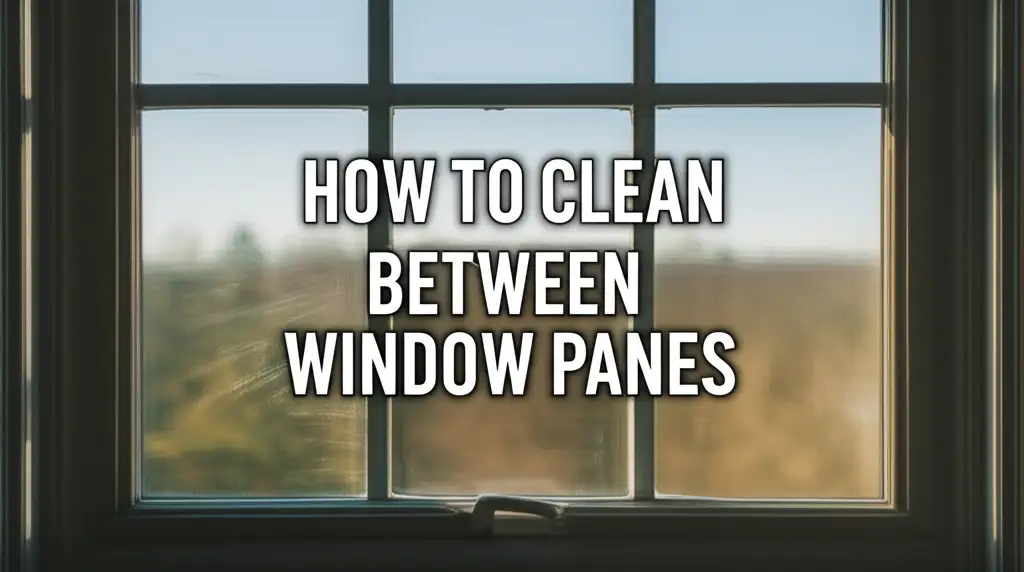· Home Maintenance · 15 min read
How To Clean Inside Double Pane Windows

Tackle Foggy Panes: How to Clean Inside Double Pane Windows
Have you ever looked out your window only to see a hazy film or streaks that just will not go away? It is a common problem with double pane windows. This issue means the dirt or condensation sits inside the sealed unit, between the two glass panes. I know this can be frustrating because standard cleaning methods do not work.
You are not alone in facing this challenge. This article will explain why this happens. We will explore the limited ways to approach this issue yourself. Most importantly, we will discuss when professional help is the best solution. Get ready to understand your windows better.
Takeaway:
- Dirt or fog inside double pane windows usually means a failed seal.
- DIY cleaning between the glass panes is generally not possible or wise.
- Professional repair or replacement often brings lasting clarity to your windows.
Cleaning inside double pane windows, meaning the space between the glass panes, is generally not a DIY task due to the sealed unit design. Dirt or condensation between panes indicates a broken seal, which requires professional repair or replacement of the insulated glass unit (IGU) for a permanent solution.
Understanding Double Pane Windows and Internal Dirt
Double pane windows are a key feature in many homes. They provide better insulation than single pane glass. These windows consist of two panes of glass separated by a spacer. This creates a sealed air gap. This gap is often filled with an inert gas like argon for even better insulation.
This sealed unit is called an Insulated Glass Unit, or IGU. The edges of the IGU are sealed tight. This keeps moisture and dirt out. It also traps the insulating gas inside. The goal is to create an airtight barrier.
The Anatomy of an Insulated Glass Unit (IGU)
An IGU looks simple, but it has specific parts. There are two glass panes. These panes are held apart by a spacer bar. The spacer often contains a desiccant. A desiccant is a drying agent. It absorbs any trace moisture left inside the unit during manufacturing.
The entire edge of the unit gets sealed. This seal is crucial for the window’s performance. It prevents outside air and moisture from entering the space between the glass. When this seal works, your windows stay clear and efficient.
Why Your Window Seal Fails
A window seal does not last forever. Many factors can cause it to break down. Extreme temperature changes put stress on the glass and seal. Constant heating and cooling can make materials expand and contract. This movement eventually weakens the seal.
Age is another big factor. Most seals have a lifespan, often 10-20 years. Manufacturing defects can also cause early failure. Once the seal breaks, the protective barrier is gone. Outside air, moisture, and dust then get inside the space between the panes. This leads to the fogging and dirt you see.
Identifying the Cause: Condensation, Dust, or Mold?
Before you try to clean inside your double pane windows, you need to know what problem you face. Is it condensation? Do you see dust or streaks? Is mold growing between the panes? Each issue points to a specific cause and needs a different solution. Proper identification helps you pick the right next step.
Is it Just Surface Condensation?
Sometimes, windows look foggy on the outside. This is often just surface condensation. It happens when warm, moist air touches a cold window surface. This is normal. You can easily wipe it away with a cloth. It often disappears on its own as temperatures change.
If the fog is on the inside surface of your room-facing pane, it means your indoor humidity is high. You can wipe this away too. Surface condensation is not a sign of a broken window seal. It indicates normal environmental conditions.
Persistent Fogging: A Sign of Trouble
If you cannot wipe away the fog, it is usually trapped between the glass panes. This is persistent fogging. It signals a problem with your window’s seal. When the seal breaks, moisture-laden air gets into the IGU. This moisture then condenses on the cold glass surfaces inside the unit.
The fog often appears as streaks or water droplets. It may come and go with temperature changes outside. However, it will always return. This means the seal failed, and the desiccant inside the spacer is saturated.
Visible Dirt and Mold Between Panes
Beyond condensation, you might see actual dirt, dust, or even mold. These particles can enter the unit once the seal is compromised. Dust floats in the air and can work its way into the broken seal. Mold spores also exist in the air. If moisture is present between the panes, mold can grow.
Seeing mold or dirt means the seal is definitely broken. It also means the internal environment of your window unit is no longer clean. You cannot reach these contaminants. This type of “dirt” needs a professional solution. You might even find yourself considering cleaning your general window exteriors to remove hard water stains or applying different cleaning solutions for tough grime. For example, some people find success using cleaning products that leverage vinegar and baking soda for various household tasks. This can be helpful for general cleaning around the window, but not inside the sealed unit. You can learn more about cleaning hard water off windows here.
Can You Really Clean Inside Double Pane Windows Yourself? (The DIY Reality)
Many people wonder if they can simply clean the inside of their foggy double pane windows. I understand this desire to fix things yourself. However, the short answer is usually no. Trying to clean between the panes of a sealed double pane window unit is very difficult. It often causes more harm than good.
Double pane windows are sealed units by design. Breaking that seal for cleaning purposes is counterproductive. It eliminates the insulating benefits of the window. It also voids any existing warranties you might have. You risk damaging the glass and frame in the process.
Why DIY Cleaning is Not Recommended
Attempting to clean inside the sealed unit is highly risky. You would need to separate the glass panes. This is a complex task. It requires special tools and expertise. Most homeowners do not have the equipment or knowledge to do this safely. You could easily shatter the glass.
Even if you managed to separate them, resealing them perfectly is another challenge. A poor seal allows moisture and air back in. This means the fogging problem will return quickly. It would leave your windows worse than before.
The Risks of Breaking the Seal
Breaking the seal of an IGU brings several problems. First, you lose the insulating gas. This gas, usually argon, helps reduce heat transfer. Without it, your windows become less energy-efficient. Your energy bills might go up.
Second, you introduce new moisture and dust. The interior of an IGU is supposed to be dry. Opening it up lets in humid air. This new moisture will condense again. It will make your windows foggy once more. Third, you risk damaging the window frame or glass beyond repair. This makes the unit unusable. Some older window types might have removable sashes, making cleaning plastic windows on a boat or other specific setups different. For instance, cleaning plastic windows on a boat has its own set of techniques. But house double pane windows are usually sealed.
Limited Scenarios for DIY Access (and why they’re not ideal)
In very rare cases, some older or custom window designs might allow access between panes. This is not typical for standard residential IGUs. Some DIY guides suggest drilling small holes into the window. They recommend injecting a cleaning solution and then drying it out. I strongly advise against this.
Drilling holes destroys the window’s integrity. It permanently breaks the seal. You also lose the insulating gas. This method does not fix the underlying seal failure. It simply provides a temporary clear view at a high cost. The holes then need to be plugged. These plugs often fail over time. More moisture can enter. This process voids your warranty. It makes the window inefficient. It can also lead to more serious issues like black mold growth if moisture remains. Cleaning black mold off wood, for example, is a separate and serious task. You might try general cleaning compounds on surfaces. Using common household items like vinegar and baking soda is effective for many cleaning tasks. You can find tips on how to clean with vinegar and baking soda for various applications. However, these are not for inside your sealed window.
Addressing a Broken Window Seal: Repair vs. Replacement
Once you confirm a broken window seal, you face two main paths: repair or replacement. “Repair” in this context rarely means fixing the original seal. It usually refers to a professional service that tries to restore clarity. “Replacement” means installing a new IGU or a whole new window. Your choice depends on the window’s age, the extent of the damage, and your budget.
Professional De-Fogging Services
Some companies offer “de-fogging” services. They drill small holes into the glass. Then they inject a cleaning solution. After cleaning, they use a vacuum to remove moisture. Finally, they apply a sealant to the holes. This process removes the visible condensation.
However, de-fogging does not truly fix the broken seal. It addresses the symptom, not the root cause. The insulating gas is lost. The window’s energy efficiency does not fully return. Moisture can also re-enter over time. This makes it a temporary fix. It is less expensive than replacement, but not a permanent solution.
Replacing the Insulated Glass Unit (IGU)
Replacing just the IGU is often the best solution for foggy windows. This involves removing the old glass unit from the existing window frame. Then, a new, factory-sealed IGU is installed. This method keeps your original window frame intact. It is less costly than replacing the entire window.
A new IGU brings back the window’s original efficiency. It restores clear views. This is a common and effective repair. It is a permanent solution to a broken seal. This option is ideal when the window frame is in good condition.
When to Consider Full Window Replacement
Sometimes, replacing the IGU is not enough. If your window frame is old, damaged, or showing signs of rot, a full window replacement is wise. Old frames can have issues like drafts or poor insulation. Replacing the entire window updates your home’s appearance. It also significantly improves energy efficiency.
A full replacement is a larger investment. However, it provides the best long-term benefits. It can solve persistent draft problems. It also brings modern window features. This includes better security and noise reduction. It is a decision that requires careful thought about your budget and your home’s overall needs.
Preventative Measures to Protect Your Double Pane Windows
Taking care of your windows can help prevent seal failure. While you cannot stop the natural aging process, good maintenance extends your windows’ life. Small actions can save you from big repair costs later. I want to share some easy steps you can take.
Maintaining Exterior Window Surfaces
Regularly clean the outside of your windows. Dirt, grime, and hard water stains can build up. These can affect the window frame and seal over time. Use a soft cloth and a mild cleaning solution. A mixture of water and a little dish soap works well. Rinse thoroughly. This keeps the glass clear and reduces wear on seals.
Check the weep holes in your window frames. These are small drainage holes. They allow water to escape. If they get clogged, water can sit in the frame. This increases moisture exposure near the seal. Clear them out regularly with a small wire or compressed air. Keeping the glass itself clean can make a big difference in appearance and longevity. For instance, cleaning your glass stove top with vinegar demonstrates how effective simple ingredients can be on glass surfaces.
Controlling Indoor Humidity Levels
High humidity inside your home stresses window seals. Excess moisture in the air can try to escape through any weak points in the seal. It also makes your home less comfortable. Use dehumidifiers in damp areas. Ensure proper ventilation in bathrooms and kitchens.
Adequate air circulation also helps. Open windows for short periods when outside air is drier. Keeping humidity levels balanced protects your windows. It also prevents condensation on the interior surfaces of your window panes.
Routine Window Inspection Tips
Make it a habit to inspect your windows regularly. Look for any early signs of seal failure. Check around the edges of the glass. Are there any small cracks in the caulk? Do you see any discoloration on the spacer bar? Early detection can sometimes lead to faster and cheaper repairs.
Look for signs of condensation that disappear quickly. This could be a precursor to permanent fogging. Check the window frames for rot or soft spots. Ensure the sashes operate smoothly. This simple inspection can tell you a lot about your window’s health.
When to Call a Professional for Double Pane Window Issues
I know it is tempting to tackle every home repair yourself. However, some jobs truly need expert hands. Cleaning inside double pane windows, or rather, fixing the issues that cause internal dirt and fog, is one of them. If your windows show persistent fogging or visible dirt between the panes, it is time for professional help. Do not wait until the problem worsens.
Signs You Need Professional Help
Here are clear signs that a professional is necessary. If you see constant condensation between the glass panes, the seal is broken. You cannot fix this with cleaning products. Visible dirt, dust, or mold inside the sealed unit also means seal failure. These require specialized equipment to address.
If your window frames are rotting or deteriorating, a professional can assess if a full replacement is needed. Any drafts coming through your closed windows could indicate seal issues or frame problems. A professional can diagnose the exact problem and suggest the correct solution.
Choosing a Reputable Window Specialist
Selecting the right professional is important. Look for companies with good reviews and a strong local presence. Ask for references from past clients. Ensure they specialize in window repair or replacement. A general contractor might not have the specific expertise for IGUs.
Get multiple quotes. Compare not just prices, but also the proposed solutions. Ask about warranties on their work and the new IGU. A reputable company stands behind their products and services. They will provide clear explanations and honest advice.
What to Expect from Professional Service
When a professional comes to your home, they will first assess your windows. They will identify the exact cause of the problem. If it is a failed seal, they will likely recommend replacing the IGU. They will measure your existing unit precisely. This ensures the new glass fits perfectly.
The replacement process usually takes only a few hours per window. They remove the old glass. Then they insert the new, custom-made IGU. The work is usually clean and efficient. You can expect your windows to look clear again. You can also expect improved energy efficiency after a new IGU is installed.
FAQ Section
Q1: Can I drill holes to drain condensation from my double pane windows?
A1: I strongly advise against drilling holes in your double pane windows. This action destroys the window’s sealed unit, voids any warranty, and releases the insulating gas. While it might temporarily remove condensation, it does not fix the broken seal. Moisture and dirt will return, and your window’s energy efficiency will greatly decrease.
Q2: How much does it cost to fix a foggy double pane window?
A2: The cost to fix a foggy double pane window varies. Professional de-fogging services are generally less expensive, but they offer a temporary fix. Replacing just the insulated glass unit (IGU) is more costly but provides a permanent solution. Full window replacement is the most expensive option, but necessary if the frame is damaged.
Q3: What causes condensation between window panes?
A3: Condensation between window panes is almost always caused by a broken or failed seal on your insulated glass unit (IGU). When the seal breaks, moist air from outside enters the space between the glass panes. This moisture then condenses on the cold interior surfaces of the glass, causing the foggy appearance.
Q4: How long do double pane window seals last?
A4: Double pane window seals typically last between 10 to 20 years. Their lifespan depends on factors like window quality, climate, installation, and exposure to direct sunlight. Extreme temperature fluctuations and constant expansion and contraction can shorten a seal’s life. Regular maintenance can sometimes help prolong it.
Q5: Is it worth repairing a broken window seal?
A5: Yes, it is often worth repairing a broken window seal, especially if your window frames are in good condition. Replacing only the insulated glass unit (IGU) is more cost-effective than replacing the entire window. It restores the window’s clarity and energy efficiency without a full-scale renovation project.
Q6: Can I clean double pane windows from the inside my home?
A6: You can certainly clean the interior surface of the inner pane of your double pane windows from inside your home. This is just like cleaning any other window surface. However, you cannot clean between the two panes of glass without compromising the sealed unit, which is not recommended for homeowners.
Conclusion
Seeing dirt or fog inside your double pane windows is a common and frustrating problem. I hope this guide helps you understand why this happens. It is important to know that true inside cleaning, meaning between the sealed panes, is rarely a feasible DIY task. This issue almost always signals a broken window seal. Attempting to fix it yourself often creates bigger problems.
Instead, focus on proactive window maintenance to extend their life. If you notice persistent fogging or visible dirt between the glass, know that professional solutions exist. Consulting a window expert ensures a proper diagnosis and lasting repair. Whether it is a new insulated glass unit or a full window replacement, getting professional help restores your view and maintains your home’s energy efficiency. Do not let foggy windows diminish your home’s beauty or comfort any longer.
- double pane windows
- window cleaning
- foggy windows
- window condensation
- broken window seal




